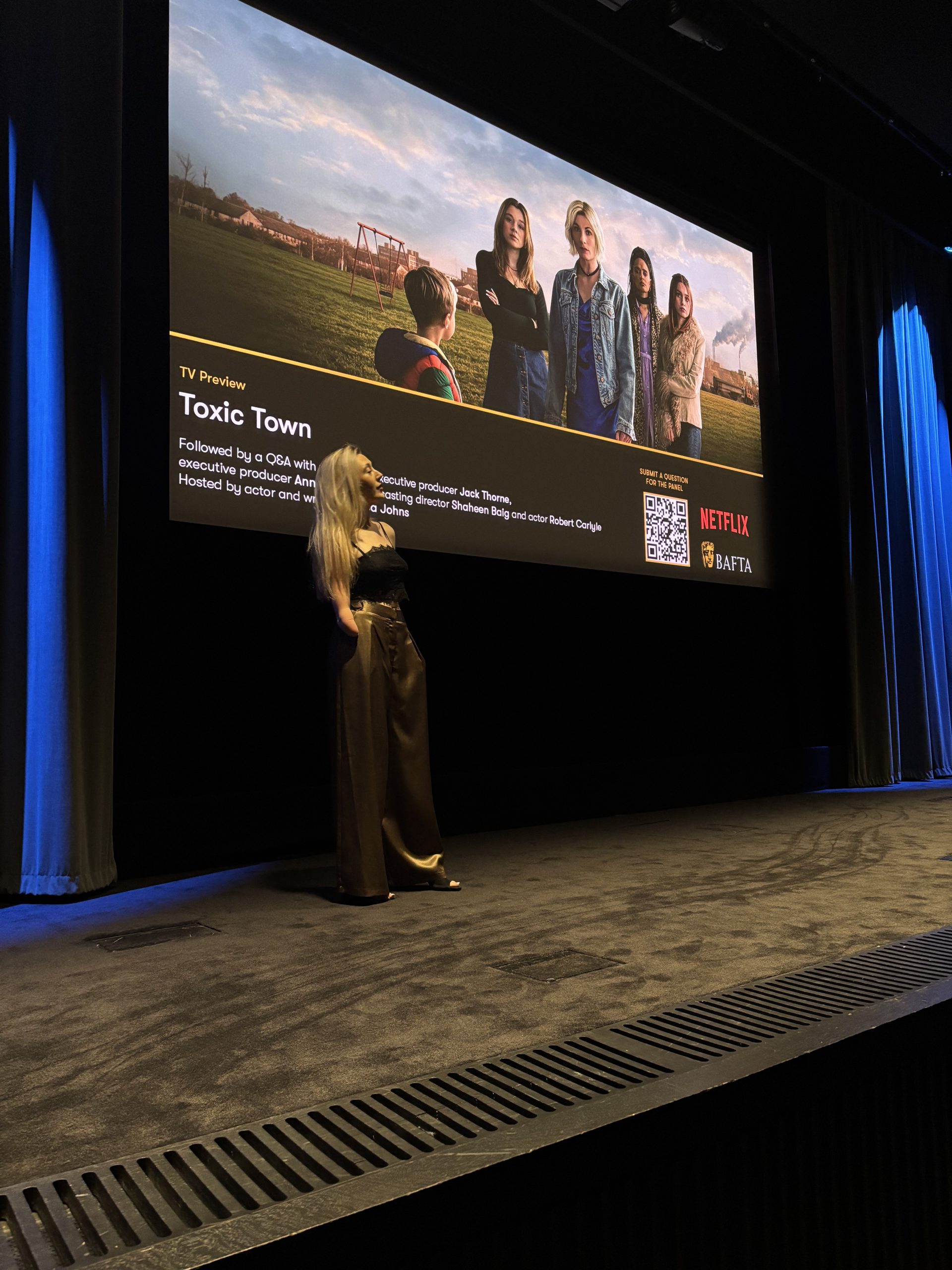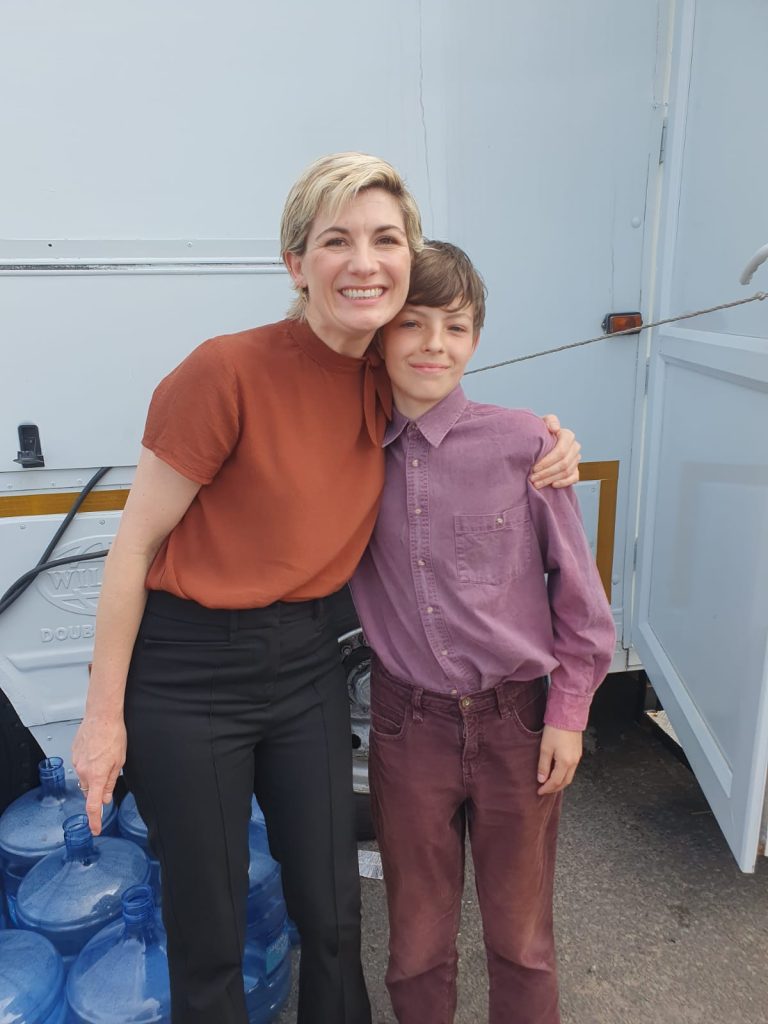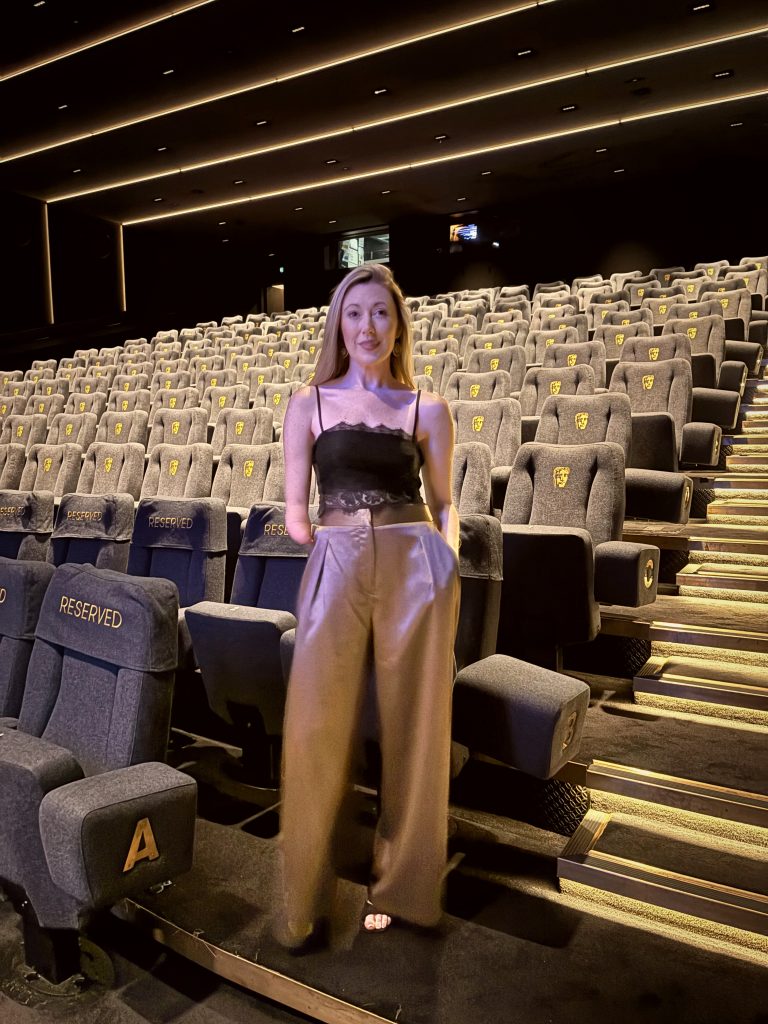Editor column by Max Swinhoe
After the recent release of the Netflix series, Toxic Town, I caught up with Reach Ambassador and actor Melissa Johns to discuss representation, equal opportunities, and how we might reframe what representation means…

What is representation?
For Reach representation means accurate, authentic and meaningful portrayal of people with upper limb difference/s in media, culture, and society. Reflecting lived experience and moving beyond stereotypes and tokenism.
Representation has been hailed the hero goal in recent years, knowing the impact it can have for people with differences to see themselves reflected in say, the TV we watch and the social platforms occupy with the hope it will become the ‘norm.’
But, Melissa suggests that we might review this way of looking at representation and instead focus on equality of opportunity to ensure that the depiction truly reflects us, and therefore representation will be the wonderful byproduct.
“TV is life, we’re representing the world we live in and the world we live in is not one thing or another, and it is about getting the balance right.”
So, should representation be the goal?
While representation is crucial, perhaps it shouldn’t be the reason for hiring disabled actors, for example. The focus should be on the talent, storytelling ability, and skill of those people, with representation naturally following.
Melissa believes we’ve made ‘representation matters’ the driving force.
“I would rather that it was the byproduct. I want people to employ me because of the way I tell stories, the way that I take on characters, and hopefully, because they see a talent in me or my other fellow limb different actors, and any disabled actor. Then representation will be the result. The driving force should be that we’re asking for equality of opportunity, not necessarily equality of outcome.”
Melissa believes we should be looking for the best people to tell life’s stories. And when telling stories about a specific lived experience e.g., limb difference, that lived experience NEEDS to be represented in the writing and casting as a minimum.
I want people to employ me because of the way I tell stories, the way that I take on characters, and hopefully, because they see a talent in me or my other fellow limb different actors, and any disabled actor. Then representation will be the result.
We discussed what happens when we don’t see difference regularly and the impact that then has when we do. It has the potential to affect us more than was intended, when in fact it is just one story among so many.
“Toxic Town was never meant to be everyone’s story,” says Melissa. “There are going to be relatable bits and unrelatable bits, it doesn’t make that story right or wrong.”
In fact, it starts a conversation and that’s a step in the right direction, we just have to be sensitive to the fact that these kinds of stories can be triggering for people.

If representation ought to be the byproduct of equality of opportunity, how do we progress?
Maybe taking a more overview approach, understanding that programmes like Toxic Town won’t be the only or last thing we’re going to see that represents upper limb difference, will help to give it the right weight.
“Lots of us are watching it, we are feeling heaps of different things, but I do when I watch lots of shows.”
So perhaps zooming out and seeing Toxic Town for what it is, until the next show hits our screens is the way forward, although this doesn’t negate the very real feelings people are having when they’re watching it.
On a more positive note, though, it is representing limb difference; it’s starting conversations and it’s stirring empathy. So, how do the arts and screen industry grow?
“We need to include more voices and when that happens, there’ll be less of a spotlight on one particular story,” says Melissa.
We need to continue to push the industry to change the narrative; yes the industry should evolve and ensure diversity is built into casting from the outset but it needs to be beyond tokenism and instead be based on meaningful inclusion. Equal opportunities for casting, and hiring actors with lived experience brings depth to those stories. Our TV and media ought to reflect the diversity of the real world.
When it comes to the actors, some of which are young Reach members, it sounds like it’s been a wonderful experience, proud to represent upper limb difference on our screens.
“If you’d have seen them at the BAFTA screening event! They looked dapper and their parents were so proud and, you know, they got to act. They got to do what they’re actually really good at, which is just to be actors. And they were rightly cast.”

But Melissa agrees too that with the sharing of real stories on shows such as these, some responsibility has to lie with the creators. So, what responsibility do they hold for sharing these stories?
“We are right to be advocating with Netflix to have a signpost at the end. I’ve been advocating for the production company to support Reach… because I do think that if you take it upon yourself to write a story that talks through somebody else’s lived experience, then it is your responsibility to support that community with the aftermath of it.”
I agree with Melissa, I think despite representation being a positive outcome in one regard, we cannot forget the impact that such a programme can have. As a Reach adult, I’m foreseeing more questions and queries about the cause of my limb difference… And I’m aware too from discussions in the community that parents have connected with the feelings of guilt that are portrayed in the series, and all the emotions it’s bringing up.
“We’ve been left with the weight of thinking, why does this feel weird for me or I don’t know how I feel, and yet I think I’m going to have to comment, and advocate, or not advocate for this. And that’s really tough. But the bottom line is, you don’t. You can say ‘I don’t really want to discuss it.’ You can say ‘that wasn’t my story.’ It’s perfectly acceptable to say, ‘I enjoyed it as a show but it’s not my lived experience, so I can’t comment on that.’”
I think that’s great advice from Melissa, having been in the position in the past when it feels like I’m representing or having to answer something for the whole limb difference community. But the truth is, we are all different. And our stories in this life are different and the people asking the questions don’t always understand that.
So, what about the empathy that shows like this have the power to create for audiences?
We agreed that another aspect that could come from shows like this, is a growing empathy for the Reach community. Empathy for what the mothers and families must have gone through. The unknowing, the guilt and the heartbreak.
At the screening, Melissa saw empathy in action.
“People cried when they were meant to cry because a woman lost her baby, and that is truly heartbreaking. We saw a woman not know what to do because she didn’t know that was going to happen. And it didn’t show up on a scan like we would have thought. Empathy is a human response.”
For me, who admittedly didn’t know how to judge Toxic Town at first, I think understanding that the characters do not represent every person, or every story certainly helps put it in perspective, and now considering the empathy that could be borne from it, is quite amazing.
For people outside of the Reach community to actually connect with what it might feel like for a parent to have a child with a limb difference or find out that their child will be born with a limb difference – I think that could be a really powerful thing for Reach.
Melissa is aware, however, that empathy can sometimes evolve into pity.
“Our job as advocates is to ensure people don’t sink too deep into it. Empathise with how somebody might feel because they’re a new mum and their whole world has changed, but also know that actually in the 90s, the world was different and maybe it wasn’t ready for that baby.”
And we know, too often as Reach adults, as we both recall, empathy can be replaced by pity and people feel the need to apologise for the fact we’ve been born different. But Melissa asks people not to pity our community.
“Please don’t be sorry. We have our down moments and our terrible days just like everybody else, but you haven’t got to be sorry. What you can do is listen to what we have to say and what we have to say is we don’t want your pity; we want equal opportunities; we want to be in the room.”
Siobhan & Andrew Traynor
I caught up with Reach mum Siobhan, her son Andrew featured in Toxic Town and in the recent BBC drama, Adolescence.
“It’s been great seeing Andrew in both dramas. When I spoke to the casting agent after TT, the chaperones and all the crew had wonderful things to say about how he conducted himself, which was really lovely, as he, unlike most of the others, had no experience on a set and doesn’t normally enjoy being seen. It has helped with his confidence.
[Watching Toxic Town] I understood the ‘we blame ourselves’ part, I had so much empathy for them all. I thought it was a really good drama, I know the language used was normal for that time, so I didn’t take any offence from it. Though I do think it would have been nice to have been able to see the kids on camera more, playing pool in the pub for example. Showing them having fun – the ones the mums were fighting for.
I asked Siobhan how Andrew has found his acting experiences so far.
“Andrew has had loads of pupils at his school talking to him about the shows. I think they’ve opened up some very important topics for discussion. I think it shows that, if you want something you can get it.
Andrew [laughing] said his main reason was the money! He liked being part of it all and helping to show what the families went through. No one really questioned him about his arm on any of the things he’s been in. He really likes acting and wants to do more with speaking parts, but if not, then he’d want to work behind the scenes on camera or sound.”
Shared from Within Reach Magazine Spring 2025. Read the latest Within Reach magazine here!

